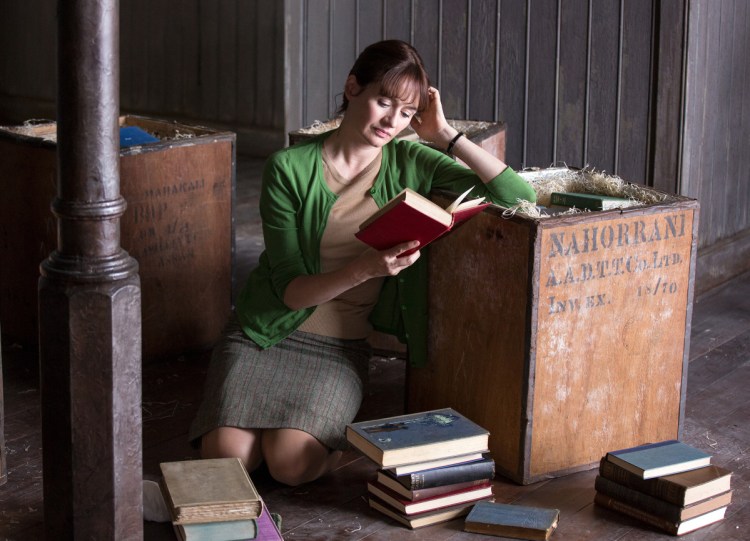I so looked forward to spending a couple of hours with two of my favorite British actors: the wispy Emily Mortimer and the wonderful and always enigmatic Bill Nighy. Imagine my surprise when I found that they weren’t here.
Well, they’re here, of course, but encased in two very different and somber roles. Funny, I never think of either as being somber.
The last time I spent an evening with Mortimer was in Sally Potter’s “The Party,” in which she was playing an impish, pregnant little lesbian, all decked out in painter’s pants and sneakers.
And Nighy? After great turns in “The Best Exotic Marigold Hotel” and “Love Actually,” both masterpieces of comic acting, I find that he has hidden crevices full of other voices and other rooms.
There are others here, of course. There is the lovable Patricia Clarkson, but you won’t like her character. In fact, there aren’t many “lovables” in director/writer Isabel Coixet’s curious village.
It’s sometime in the 1950s now as we find ourselves in a smug little British seaside town of stuffy Brits who delight in stale biscuits, tepid teas and gossipy cocktail hours, all led by Violet Gamart (yes, Patricia Clarkson), a matronly arriviste.
Florence Green (Mortimer), widowed since her husband died in World War II, has arrived here looking for a new beginning when she comes upon a pile of stones the villagers call “The Old House.” So begins Emily’s opening of a bookshop in a town that has never had one.
Emily manages a loan from the stunned and suspicious bank officers and orders her first delivery of books.
It’s not long after she hangs out her shingle that a stream of local suspicion and animosity begins to bubble up. It appears that our village has never had a bookshop, because no one there reads anything but the obituaries and gossipy notes.
Still, a curious few, and then more readers come peering in the windows and then pop in and buy some books.
With business perking up, Florence hires a teenage assistant, Christine (Honor Kneafsey), to dust and fuss and discovers she has a curious admirer, this being the reclusive Edmund Brundish (Nighy), who seldom ventures far from the gates of his mysterious stone manor. He loves books, but not the paper covers, which he simply sets afire.
Florence is intrigued and has her tiny assistant deliver books up the hill for Edmund to peruse. Before long she introduces him to new authors, especially the works of Ray Bradbury.
But Violet Gamart’s tea and crumpet crowd, feeling their hamlet is being threatened, are being stirred up.
It’s made clear to Florence that old Violet’s dream has always been to turn the Old House into a cultural center, where presumably she would entertain her nonreading toadies with nightly salons.
While all of this chichi chicanery is brewing, various attempts are made by some of Violet’s younger sycophants to sabotage Florence’s dream shop, such as sneaking “closed” signs into the window of her very open shop. It will get worse.
But back to the real reason to see “Bookshop,” Bill and Emily.
Edmund, enchanted by the combination of Bradbury and Florence, springs to life and invites Florence to a grand tea, featuring, of all things, a splendid bundt cake. It’s a not-to-be-missed stand-out scene, a whimsical cocktail of both Edmund’s hidden impishness and Florence’s long-buried kittenish gifts.
Of course, it was inevitable that Violet’s maleficence would reach Edmund. Infuriated and in full rage, he storms up to her house and demands her to cease her negative actions. Now we can see a storm arising.
Two tragedies will end this tale before the sun goes down and the local ferry slips its moorings.
“Bookshop’s” screenplay was written by Spanish director Coixet (“The Secret Life of Words”), taken from Penelope Fitzgerald’s novel.
Not all hearts will be warmed here, but at least we will have spent some time by the sea with Emily and Bill, two of my favorite actors.
J.P. Devine, of Waterville, is a former stage and film actor.
Send questions/comments to the editors.


